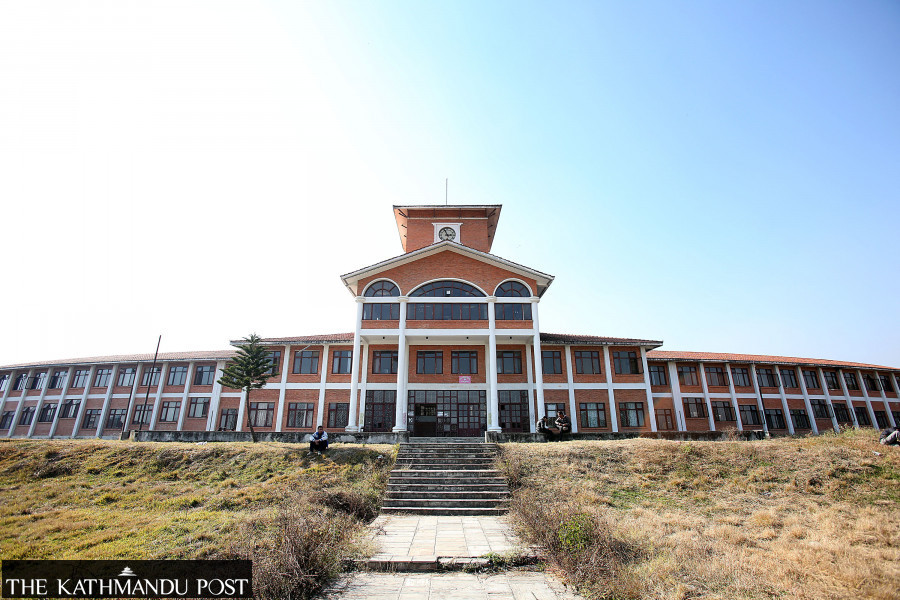National
As more universities are in the pipeline experts ask if Nepal needs so many
If things go as planned, the country will have 16 universities in a couple of years.
Binod Ghimire
The National Assembly on Wednesday endorsed a bill to establish a new Yogmaya Ayurveda University with a majority vote.
Once the bill is passed by the House of Representatives, it will pave the way for setting up the university, which will be Nepal’s 12th. As all major parties are unanimous on the bill, its passage by the lower house looks certain.
The new university, which will be fully funded by the government, will be established in Arun Valley, which straddles Sankhuwasabha and Solukhumbu districts in eastern Nepal. The university is named after Yogmaya Neupane, a pioneer mid-20th century social reform campaigner and poet from Bhojpur. The bill says there is a need for a university to produce qualified human resources in Ayurvedic medicine and this will be addressed with the establishment of the Yogmaya Ayurveda University.
There are at least three more universities in the pipeline. The bill for the establishment of Madan Bhandari University of Science and Technology, which is named after the noted communist leader the late Madan Bhandari, is already in the lower house while the erstwhile government of KP Sharma Oli through the national budget announced to add two more universities and facilitate the establishment of the University of Nepal, a new fully autonomous university to be established by a group of academics.
“Madan Bhandari University of Science and Technology, established to produce world class human resources in the field of science and technology, will be brought into operation next year at Panchkhal in Kavre district,” reads the national budget document. “Infrastructure for the engineering faculty will be set up at Chitlang, Makawanpur.” The government has allocated Rs 1.55 billion to construct the infrastructure for the science and technology university.
The government is working to set up yet another university named after the late communist leader Bhandari. The Oli government had announced plans to bring Madan Bhandari Polytechnic University into operation within the next two years. Similarly, the government has also prioritised setting up the National Defence University while it has formed an Infrastructure Development Preparation Board for the University of Nepal. Except for the University of Nepal, the government itself will take the initiative for setting up all other universities.
If things go as planned, the country will have 16 universities in a couple of years. Education experts meanwhile say although it is good to have more universities they should be set up on a need basis and with proper planning. Kamal Krishna Joshi, former chair of the University Grants Commission, says there is a growing tendency among politicians of announcing universities without proper home work and planning. “First we should figure out what kind of human resources is needed in the next 10 or 20 years and universities should be set up accordingly,” he told the Post. “I haven’t seen such planning.”
Joshi, who also is a former vice-chancellor of the Tribhuvan University, said there are instances of the government putting unnecessary pressure on the University Grants Commission to give permission for new universities. The commission’s approval is needed for starting the process for setting up new universities. Experts say there is a trend of setting up universities that offer similar courses as the existing universities.
For instance, established in 1986, Nepal Sanskrit University, which was formerly known as Mahendra Sanskrit University, is the second oldest university in the country. But after the number of students wishing to pursue Sanskrit studies declined, it started to struggle to sustain itself. Then it launched Ayurveda studies. Similarly, the Tribhuvan University also offers bachelor’s and master’s degrees in Ayurveda studies. “Why do we need a separate university when the existing universities that are offering the Ayurveda studies are already struggling,” questioned Khim Lal Devkota, a National Assembly member who also is an expert on federalism, objecting to the government’s plan. “I would demand withdrawal of the bill [on Yogmaya university].” He said the government should not set up new universities without a needs assessment.
Education experts say the universities that were established after 2006 had a major goal of promoting innovation and research, however, their functioning is no different than the old universities like the Tribhuvan University. “Maintaining a professional academic environment is a major challenge for the universities,” Tanka Nath Sharma, a professor at Kathmandu University, told the Post. “Curbing politicisation is a big challenge.”




 9.89°C Kathmandu
9.89°C Kathmandu














